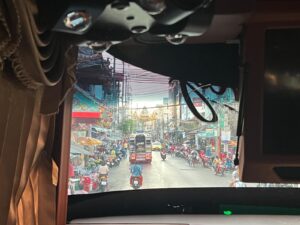My time abroad with the CIBS Asia Business Program in Singapore and Bangkok has provided me with valuable insights into how business is conducted between counterparties from diverse backgrounds and cultures. These insights were gained through engaging with individuals in the host countries, whether in large corporations or small mom-and-pop businesses.
One specific business practice I encountered was shared by an executive at Betagro, a company we visited in Bangkok. He explained the qualities he looks for when recruiting new talent, particularly among younger candidates. According to him, the most desirable candidates are not just those who are passionate about Betagro but also those who have a genuine interest in the industry Betagro operates in. He pointed out that many young people today focus primarily on the benefits a company offers—such as salary, health insurance, and paid time off—rather than on contributing to the company’s success. This mindset, he explained, often leads individuals to prioritize personal gain over maximizing shareholder value by competing effectively in the market. “What Betagro looks for in younger candidates,” he emphasized, “is a drive to build a career within the food production industry and excel—not immediately, but over time as they gain more experience.”
This conversation with the Betagro executive made me realize that this approach to business in Asia aligns with practices I have encountered back home in the United States. For example, while interviewing to join a high-impact program (TRIP) at Mays Business School, I noticed that every company on the interview board asked the same question: “Why do you want to join TRIP?” Initially, I focused on how the program would benefit me, highlighting features like its three internships and unparalleled connections. However, this approach did not elicit positive reactions. When I reframed my answer to focus on how TRIP would enable me to make a meaningful impact on others and the world, the interviewers leaned in and nodded in agreement.
Reflecting on my initial impressions of Singapore, I would say they were largely accurate. The residents indeed look out for one another and maintain a strong sense of dignity, which is evident in how the environment reflects the community’s values of beauty and order. However, my impressions of Bangkok evolved significantly. When I first arrived, I found it less orderly and clean compared to Singapore. Yet, as the days passed, I came to appreciate the authenticity and warmth of the Thai community—qualities that Singapore had a little less of.
Moving forward, I will always strive to give second chances to the people, places, and experiences I encounter. This trip has taught me that what initially feels foreign or unfamiliar may ultimately resonate more deeply than I could have anticipated.


